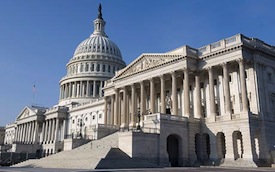New START and Midterm Election Politics
October 1, 2010
Featured Image
Today's top nuclear policy stories, with excerpts in bullet form.
Stories we're following today: Friday, October 1, 2010.
Foreign Policy and the 2010 Midterms: New START and Arms Control – Greg Bruno of the Council on Foreign Relations [link]
- Obama has urged senators to swiftly approve New START, and Vice President Joseph Biden has said ratification "will protect our security and make the world a safer place." Yet New START and nuclear weapons policy have become topics of intense partisan debate in the lead-up to the 2010 congressional midterm elections.
- Republican lawmakers and conservative analysts have expressed disappointment with the president's nuclear posture--most notably the Obama administration's financial commitment to modernizing the nuclear stockpile--and have used debate over the arms reduction treaty to highlight these concerns.
- Sixty-seven votes are required for ratification. Max Bergmann, a policy analyst at the Center for American Progress, says the current Senate could probably muster the votes for passage. And unless the prevailing congressional sentiment is significantly upended in November, few analysts believe New START will fail to be ratified.
- Yet passage is far from guaranteed. Because several states will hold special elections in November, with winners sworn in immediately--as opposed to January--a potential shift in power could complicate Democrats' efforts to win approval.
Senate Dems Vow Return to Tax Cuts - J. Taylor Rushing in The Hill [link]
- After finishing floor business near midnight Wednesday, Democrats held a handful of committee meetings Thursday morning before breaking to campaign for reelection. Before leaving, asked by The Hill to name the party’s top priorities for the Nov. 15th lame-duck session…
- Majority Leader Harry Reid (D-Nev.) has tentatively planned a lame-duck agenda with as many as 20 different pieces of legislation — a heavy lift for a session that is only expected to last about a month or less. That left Senate Democrats considering what should come first when they return.
- Some Democrats divided the lame-duck session into “must-do” items, such as the federal budget and the START treaty…
- Issues like the START treaty ratification are more likely [to come up] since it has already passed the Foreign Relations Committee on a bipartisan, 14-4 vote.
U.S. Sanctions Selectively Under its Iran Policy - Paul Richter in the Los Angeles Times [link]
- The Obama administration rolled out its first penalty Thursday under the new U.S. sanctions on Iran, but carefully avoided any challenge to Russian and Chinese companies that would have risked diplomatic fallout.
- The 4-month-old sanctions are aimed at drying up foreign investment in Iran's oil and gas sector in hopes of persuading Tehran to agree to limits on its disputed nuclear program. Some members of Congress have pressed the Obama administration to not shy away from penalizing huge Chinese, Russian and Turkish firms that have been seeking energy deals with Iran as Western companies have pulled out.
- The restrained approach drew criticism from some lawmakers and private analysts, who argue that unless these companies are quickly persuaded to back off, the Western companies that have abandoned the Iranian market — and lost substantial revenue — will demand an end to the sanctions and the entire effort will collapse.
- U.S. officials signaled that they would rather persuade foreign energy companies to back away from Iran than penalize them.
- Russia, which badly wants to continue its energy deals with Iran, has been trying to organize other major developing nations to resist the energy sanctions imposed by the U.S. and its industrialized allies. China also has been vocal about its unhappiness with the sanctions.
NATO Document Addresses Nuclear Disarmament – Judy Dempsey in The New York Times [link]
- Two months before what could be the most important NATO summit meeting in more than a decade, the 28 member states of the alliance have received a draft of its new strategic concept, which for the first time, at the insistence of Germany and other countries, includes calls for nuclear disarmament.
- The move by Germany and other nations to place disarmament high in the strategic concept comports with President Barack Obama’s declared goal of eventually abolishing nuclear weapons, but it also exposes a rift between European nations that want to rid the Continent of atomic arms and those that want to keep them both for prestige and as a deterrent to longstanding enemies.
Britain and France May Share Nuclear Deterrent - John Lichfield in Paris and Kim Sengupta for The Independent [link]
- A politically explosive proposal for joint Franco-British nuclear-submarine patrols – an idea sunk without trace in the recent past – has been brought back to the surface by the draconian defence cuts in both countries.
- Although talks are still at a preliminary stage, officials in Paris say that the idea is one possibility for cost-saving military co-operation which is likely to be discussed by the Prime Minister and the President at the annual Franco-British summit in London in early November.
- A senior British defence official acknowledged last night that the possibility of sharing nuclear deterrence capability with the French remains on the table, adding that a "number of options are being studied".
- This would reduce the number of submarines that each country has to maintain in order to preserve a "credible" nuclear deterrent. It would also help to solve a huge political problem for the Coalition Government by reducing the cost of replacing the existing Trident submarines some time after 2015.



